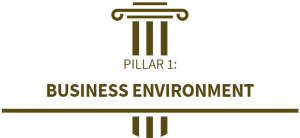
Key Indicators:
Rule of law, Burden of government regulation, Government ensuring policy stability, Country credit rating, De-jure financial globalization, De-jure trade globalization, SME access to finance
Note: This pillar captures the extent to which a country’s policy environment is conducive to companies doing business and investing.
For the tourism industry to thrive, Pakistan has to create a favourable atmosphere that supports the establishment and expansion of businesses/ enterprises and offers a seamless means of overcoming obstacles for the tourist sector to thrive. The T&T Development Index (TTDI) 2024 ranks the country at 97, scoring 3.41(1-7 best) for its business environment.[45]
The 2024 Index of Economic Freedom also ranks Pakistan 147 out of 184 countries with a score of 49.5. The index also considered Pakistan’s economic status as repressed.[46] As the Doing Business Report 2020 by The World Bank ranked Pakistan 108 out of 190 economies,[47] the ranking rose 28 places from 136 to 108.[48]
To remove the bureaucratic obstacles to draw in investment the Prime Minister has approved the launch of the largest reform programme of Ease of Doing Business.[49] It will also digitize laws and procedures and expedite company operations by shortening the time required for permits and registration.[50]
If we look at the country’s ranking in the indicators, in the rule of law the country is ranked 106 out of 119 in the TTDI 2024, with a score of 2.71 (1-7 best). This is based on property rights, judicial effectiveness, and government integrity. World Justice Project (WJP) Rule of Law Index 2023[51] also ranks Pakistan 130 out of 142 countries.[52]
Despite being an Islamic Republic country and having the constitutional right of an independent judiciary the country lags in the rule of law which is a matter of sheer concern for the authority.
In a society where laws are ignored and selectively applied, government institutions become unchecked, leading to chaos and instability. This erosion of the rule of law results in increased crime, violence, and a widespread sense of insecurity.[53]
Pakistan’s position on the indicator of the burden of government regulation is 48 in 119 economies, with a score of 4.08 (TTDI, 2024), this indicator shows how easy it is for the companies to comply with the government regulation and administrative environment. In the indicator government ensuring policy stability the country ranking is 62 with a score of 4.00, which suggests some consistency in government policies, can be beneficial for businesses and to improve the ranking.
The country’s credit rating indicator presents a concern as it is positioned at 104, with a score of 2.08. This suggests a potential decline in Pakistan’s creditworthiness, which might affect its ability to attract investments. The ranking for de-jure financial globalization and trade globalization is 106 (score, 3.20) and 93 (score, 3.64) respectively. This indicates that the government needs to change laws/regulations that are affecting financial openness and also these regulations need to support international trade.
Pakistan is taking significant steps to attract foreign investment through the Special Investment Facilitation Council (SIFC). This initiative, operating under the Board of Investment, focuses on key sectors like agriculture, livestock, hydropower, and tourism. The SIFC streamlines the investment process by unifying approvals, resolving issues, and providing continuous support throughout the investment cycle. By enhancing transparency, expediting procedures, and advocating for policy reforms, the SIFC aims to make Pakistan a more appealing destination for investors.[54]
The ranking (59) for access to finance for Small and Medium-sized Enterprises (SMEs) shows a relatively positive trend (score, 4.18) as compared to other indicators but still indicates difficulty for smaller businesses to obtain financing, which can hinder their growth.
Pakistan recorded the most incidents of any country, with 490 attacks recorded, which is a 34% increase from the previous year.
In Pakistan, small and medium-sized enterprises (SMEs) are vital, making up 90% of businesses and contributing 40% to GDP. With 5.2 million SMEs, they drive 30% of exports and employ over 80% of the non-agricultural workforce. Despite their importance, economic inefficiencies hinder their growth and potential.[55]
Initiatives like the Punjab Rozgar Scheme offer some relief, but more targeted policies are needed. Additionally, local SMEs, especially smaller ones, fall behind in technology innovation. Encouraging research and development could enhance their competitiveness. Moreover, recent efforts, such as the planned semiconductor zone in collaboration with China, aim to address these gaps, though progress remains unclear.[56]
Terrorism has damaged the country’s reputation, deterring visitors. To combat this, state legislators should prioritize law and order to enhance Pakistan’s image and attract tourists. However, despite economic challenges, northern areas remain popular tourist destinations, and promoting tourism in these regions can alleviate poverty and improve living standards.[57]
The Prime Minister has launched new efforts to reduce the cost of doing business by simplifying and digitizing investment laws and eliminating outdated regulations. While the government is optimistic, critics remain skeptical, citing past failures and the lack of secured external financing. Former officials highlight the need for coordinated public and private sector efforts to overcome the challenges. The Prime Minister has set a deadline of December 2024 to compile key laws and regulations.[58]
Overall, to improve Pakistan’s business environment and attract more investments, the government should work on strengthening these indicators.
